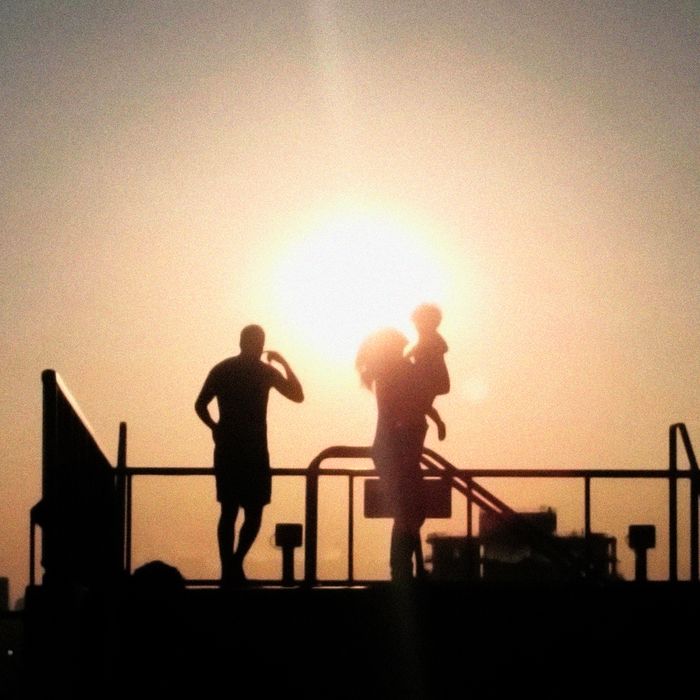
It was a Thursday in late October 2016. I was 38 years old and 35 and a half weeks into my third pregnancy. Two years earlier, I had given birth to my amazing daughter. I was less lucky when my second pregnancy ended in an early-term miscarriage. But it happens. A lot. There was nothing wrong with me. And this third pregnancy, so far, was a good one. The new baby was healthy and thriving inside my bulbous, expanding abdomen.
The morning my son Izzy died, everything was usual. The babysitter came. I went to yoga. I noticed on my way to the studio that I hadn’t felt the baby move since I’d woken up. But I told myself that I must have been distracted by the early-morning chaos and that I would feel him when I lay on my back in Savasana after practice was over. He had a way of kicking me when I was in my most relaxed state — typical child.
In the studio, anxious thoughts came and went in my mind. Was that a movement, maybe? What if something’s wrong? I’m too old to have a baby. Maybe I shouldn’t be exercising. When the class finished, I lay on my back and waited for him to shift and kick inside me so the painful mental dance would stop and I could go about my day. He didn’t move. I went home and made a lasagna in a white ceramic dish with a chipped corner. Then I went to the hospital.
I can’t recall how I got there, but the woman at reception sent me and my perpetually calm-on-the-outside husband to the labor and delivery triage. There was a woman, equally as pregnant, who was riding up to the delivery ward with us. She was in labor. I was not. Feeling like I wanted to protect her from what I was about to endure, I put my head down and shrunk from her view. I didn’t know yet that my baby had passed, but somehow I was already apologizing for it.
At the entrance of the triage, there was a small room efficiently equipped with a folding chair and a doppler. It’s the best tool to reassure moms that their babies are just fine. My husband stood next to me while a confident nurse placed the device on my body. She was not concerned as she looked for his heartbeat. First spot: nothing. Second spot: nothing. Third spot: nothing. I could see the panic in her eyes. “Maybe the machine isn’t working,” she said, retreating out of the room. I knew it was. I think she did too.
My husband and I were taken to another room, this one with an ultrasound machine, and told the doctor was on her way. As an anxious person, I’ve always girded myself with a catastrophic outlook. But expecting the worst doesn’t help when faced with a situation that is simply unthinkable. The doctor squeezed a glob of freezing cold ultrasound jelly on my stomach and aimlessly glided the machine around, as if looking for something she knew wasn’t there. I closed my eyes and all I could hear was the shrill sound of my lifeless uterus projecting through the ultrasound mechanism. It sounded like TV static, and I couldn’t change the channel. “I can’t find the heartbeat,” said the doctor. “I’m sorry.”
I rose out of the bed and, stripped of emotion from the shock, said, “Are you telling me my baby is dead?” I don’t think the doctor expected me to ask the question so bluntly, but she respected the need for finality. “Yes,” she said.
There is an antidote to childbirth whereby we mothers forget the grotesque violence we just underwent to bring our children into the world once we meet them face to face. That beautiful gift of amnesia wasn’t in the cards for me. I was told if I waited too long to give birth to the remnants of my son, I could also die.
I was escorted to a room in a more secluded area on the maternity ward so that I didn’t have to hear the primal shouts and wails of other women bringing babies into the world. And so I didn’t have to hear the babies. The protection was meager but critical. I hadn’t experienced the battle-scarred pride of birthing my daughter vaginally, but the doctor said there was no physical reason I couldn’t now. Everything went smoothly. Induction. Epidural. Two pushes. It was over. I had my vaginal birth and did it with such mastery that it seemed doubly cruel I had nothing to show for it.
They removed Izzy from the room as soon as he left my body and wrapped him, like they would any baby boy, in a blue fleece blanket. A social worker told my husband and I that we should experience holding him before he was taken away permanently or we would regret it. They sat us next to each other and brought him in. I closed my eyes, told them I was ready, and they placed him in my arms. I didn’t want to see his face. I had never seen a dead person before. Holding him, I felt like I had been hollowed out completely. Everything I had in me — my past, my future, who I was — was dead in my arms. I looked quickly at his face. He looked like my daughter. They all look like my husband, I thought and then I passed the baby on to him.
When I went home and my milk filled my breasts to the point of engorgement, I sat in the pain. It was my last connection to him. Then it dried up and disappeared. Denial only lasts so long.
When the baby that you’ve given birth to isn’t alive, it requires a little explanation. As women we are often taught to conceal our pregnancy losses, but this one was on public display. I knew if I ran into an acquaintance, not pregnant but still bloated with the remnants of what would have been my child, I would have to stave off congratulations for my new baby. I also knew my 2-year-old, who was expecting to be a big sister, would have questions of her own. I had never been so unprepared.
When I woke up the morning after leaving the hospital, I had an alert on my phone from Instagram. A friend I hadn’t spoken to in years had commented on my most recent post. “You look amazing,” she said. It was a photo of me, my husband, and my daughter at a rooftop pool, having a glorious, unexpected late-autumn swim. In the picture, a very pregnant me is throwing my daughter in the air and laughing with my husband, the sun setting behind us, with the caption “#lastswimoutsideasthree.” Of course, it wasn’t. We were going to be three for a while. How was I going to explain how truly not “amazing” I was?
At first, my husband tried to protect me, disseminating our story as best he could. I received flowers from corner-store shopkeepers, meals from restaurants down the street, and the generosity of avoidant gazes from familiar faces when they saw me. If our eyes did meet, I would smile and mouth the words, “I’m all right,” so as not to pass my burden on to them. There was a part of me that felt contagious. More than anything, I didn’t want my story to scare people away. Finessing the delivery of that information, time and time again, and doing so in a way that would be the least uncomfortable to those in receipt, was a practice that became a kind of healing meditation. “It’s okay,” I told my close friend as she sobbed; our babies were supposed to be playmates. It wasn’t. “I am okay,” I would say to a mom from my daughter’s toddler group. I wasn’t. “You didn’t know. Don’t worry. I’m fine,” I would say to that lady I met once at a party. I wasn’t.
About a month after I lost the baby, I mustered up the will to go to the grocery store. I thought I was safe from run-ins that day as it was midweek and in the slump of the afternoon. I was wrong. A close friend of mine who I hadn’t seen or spoken to since the ordeal was squeezing fruit for ripeness right down the aisle from me. I approached her. “Er, oh my God. I’m so sorry,” she said. I looked at her and said, “How terrible do I look?” It was the first time it had even occurred to me to care about my appearance in months. The superficiality felt good. “You don’t look great,” she said. As a doctor, she had a harsh and cold dedication to reality that was exactly what I needed. “What do I do?” I asked. It was a loaded question, but she answered it perfectly. “Put on some makeup and fake it until you make it,” she said. I wanted to be treated like a functioning person and not like damaged goods, and that’s exactly what she did. She was honest. She saw me — when I couldn’t — as me.
From that small moment, I began to try myself on. I found comfort in friends, went back to yoga, and spent more money than I needed to on clothes and toys for my daughter. I wasn’t great. But at least I no longer felt cut off from the future, dead in my tracks. I had lost the baby but regained that sense I had while pregnant of an unclear and new version of me on the horizon. I was becoming. And that was enough.
My older brother had been expecting a baby boy five days after my son was due. On the day I learned of the birth, I was walking through a busy shopping center, wailing into my iPhone to a friend on the other end. A woman who lived on my street saw me, and instead of moving away in fear of my pain, she walked right into it. “Are you okay?” she asked. “I’m not,” I said and unraveled in a puddle in her arms. I told her everything. It felt terrible. But it was true.
Stillbirth is a polite euphemism for what I went through, but the nomenclature is kind of pitiless. Like a mother’s brain after giving birth to a live being, mine was the opposite of still: It was in overdrive. The doctors told me there was no medical explanation for the death of my son. But I looked and looked for a reason to make it my fault. Was it that sip of alcohol before I knew I was pregnant? Did I jinx myself for posting that “perfect family” photo? Should I not have carried my daughter to her bed? Who else could be culpable? He only ever lived in me. In time, though, I came to know what anyone who has lost a child knows. Even when there is a reason — a speeding car, a launched missile — there is no reason.
As my body settled and changed with the loss, my story and how I told it changed as well. I learned to say what happened as honestly and simply as I could. I took the lead on my own grief: “I lost the baby. They don’t know what happened. There was nothing wrong with me. It’s not common, but it happens.” Seven months after the funeral for my son that I was in too much pain to attend, I had begun to accept that I was no less a mother for it. I began to be surprised and encouraged by my own resilience. The love beaming from my almost 3-year-old daughter to me was not just biology. It felt earned.
My husband and I decided to try again, and it worked. By Mother’s Day, I was pregnant. I could tell when I finally exposed my pregnancy to my friends and family that their elation at the news was tinged also with sadness. They never said it, but I knew. To brace myself for a laden pregnancy, I had to put Izzy aside and focus on the new baby. I told myself he wouldn’t mind; that’s just how it is when you’re a big brother.
Mother’s Day still comes every year. And every year, on this day, when I walk down the street with my family, people see me as a mother of two. But I know the truth. I’m a mother of three. Honoring that loss by talking about it makes me able to be present for my 9-year-old daughter, 6-year-old son, and wonderful husband in a way that is respectful to my loss but not crushed by it. My first son, Izzy, is my story. As long as I tell it, I can feel him move.




